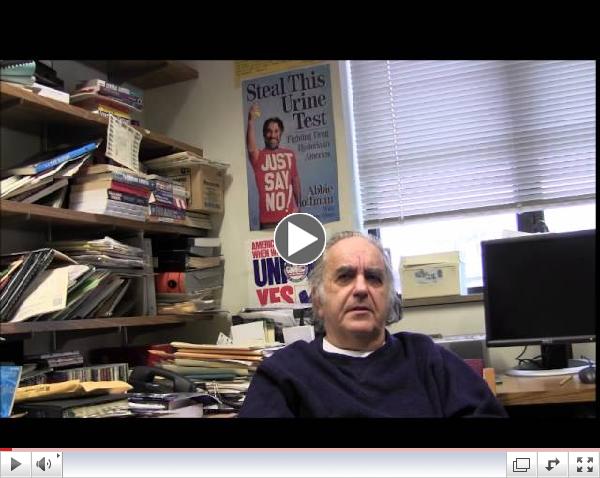 | CCDS's Harry Targ Interviewed on
Cuba, War and Peace |
|

NEW CCDS Pamphlet
on Climate Change.
|
Blog of the Week...

SYRIZA Comrades on Greece |

New CCDS Book Reporting on Vietnam
|
|
Radical Jesus:
A Graphic History of Faith 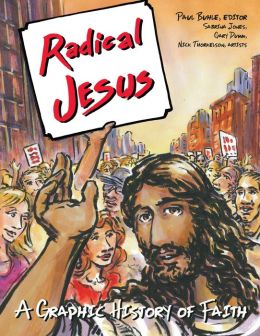 By Paul BuhleHerald Press By Paul BuhleHerald Press
|

Want to Know what CCDS has
been doing...Check it Out!
|
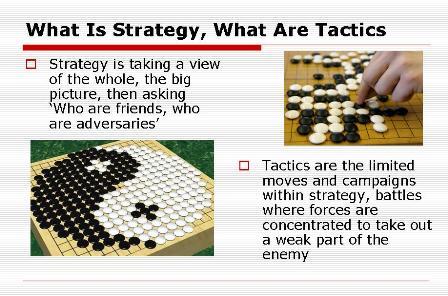 Keep On Keepin' On Keep On Keepin' OnHating the 'Middle Class,' Why Socialists Run in Elections, Strategy and Tactics Slide Slow, Class and Privilege, the Green New Deal ...and other Short Posts on Tumblr by Carl Davidson
|

Edited by Carl Davidson Revolutionary Youth and the New Working Class: The Praxis Papers, the Port Authority Statement, the RYM Documents and other Lost Writings of SDS Changemaker, 273pp, $22.50
For the full contents, click the link and view 'Preview' under the cover graphic.
|
|
By Randy Shannon, CCDS

"Everyone has the right to work, to free of employment, to just and favorable conditions of work and to protection against unemployment."
- United Nations Universal Declaration of Human Rights, December 10, 1948
I. Introduction
The "Great Recession" that began in 2007 has caused the greatest percent of job losses since the Great Depression of 1929. This crisis is the end of an era of unrestrained 'neo-liberal' capitalism that became public policy during the Reagan administration. The crisis marks a new level of instability with the growth of a global financial elite that targeted US workers and our trade unions after World War II.
|
|
Order Our
Full Employment Booklets
 |
 The new annual edition of our journal of discussion and analysis is now out. More than 170 pages, it includes 14 articles on strategy austerity, organizing, and the right. Cost is $10 plus shipping. Or get one by becoming a sustainer. Click the title to buy it directly. The new annual edition of our journal of discussion and analysis is now out. More than 170 pages, it includes 14 articles on strategy austerity, organizing, and the right. Cost is $10 plus shipping. Or get one by becoming a sustainer. Click the title to buy it directly.
|
...In a new and updated 2nd Edition
Capitalism may well collapse under its own excesses, but what would one propose to replace it? Margaret Thatcher's mantra was TINA...There Is No Alternative. David Schweickart's vision of "Economic Democracy" proposes a serious alternative. Even more fundamentally, it opens the door to thinking about alternatives. His may or may not turn out to be the definitive "successor system," but he is a leader in breaking out of the box. |
 by Paul KrehbielAutumn Leaf Press, $25.64
by Paul KrehbielAutumn Leaf Press, $25.64 | | Shades of Justice Video: Bringing Down a President, Ending a War |
|
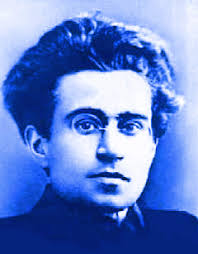 By Giuseppe Fiori
Verso, 30 pages
|

Essays on Mondragon, Marx, Gramsci
and the Green and Solidarity Economies |
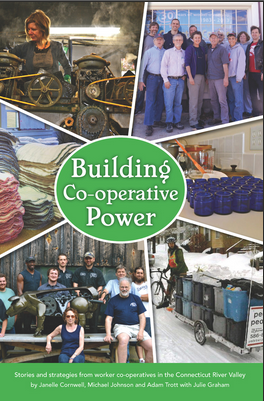
The Story of Workers Coops
in the Connecticut River
Valley Today.
Coauthors: Janelle Cornwell
(Worcester State University),
Michael Johnson (Grassroots
Economic Organizing Newsletter)
and Adam Trott (Valley Alliance
of Worker Co-operatives and
Collective Copies)
|

- Foreword by Susan Brownmiller
- Preface by Ken Wachsberger
$37.50 + $6 shipping
|
|
Discussion Documents for a Militant Movement

By Don Hamerquist
|
|
|
|
An Invitation to CCDSers and Friends...
 Welcome 2015: Welcome 2015:
Focus on White
Supremacy, War
and Austerity
We're the Committees of Correspondence for Democracy and Socialism...Do you have friends who should see this? Pass it on...Do you have a blog of your own? Others you love to read every day? Well, this is a place where you can share access to them with the rest of your comrades. Just pick your greatest hits for the week and send them to us at carld717@gmail.com!
Most of all, it's urgent that you support a raise for low-wage workers, oppose militarized police and the ongoing 'long wars,' plan for 2016 races now, oppose austerity, support the 'Moral Mondays' in North Carolina and other states, the fight for the Green New Deal, a just immigration policy and the Congressional Progressive Caucus' 'Back to Work Budget'! We're doing more than ever, and have big plans. So pay your dues, make a donation and become a sustainer. Do it Now! Check the link at the bottom... |
Black Lives Matter Must Move Beyond Protests
- Or Risk Losing the Fight for Racial Justice
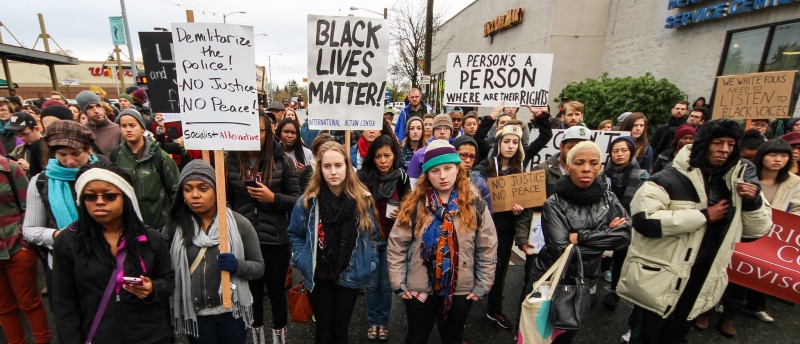
By Zeeshan Aleem
Progressive America Rising via Mic.com
Dec. 29, 2014 - Witness the rupture.
Once the worry of minorities and leftists, the ease with which a white man with a badge can end the life of a black person is finally on America's mind. The realization that police practices can be brutish and unfair to black men has become a matter of serious concern for many whites, bourgeois liberals and some conservatives - apparently even George W. Bush. Law enforcement is undergoing a crisis of legitimacy.
But the window of opportunity for the racially equalized institutional changes, which we desperately need, is wider than it's been in decades. The recent non-indictments for police killings in Ferguson, Missouri, and Staten Island, New York, have reignited awareness of the systemic nature of racial discrimination. Riot, protest and media pressure has made the White House anxious and piqued the interest of a generally useless Congress. Some modest reform is in the works.
But all of this is fragile. When there is a long enough pause in the rate at which black men are killed by the police, the cameras will point elsewhere. If there is any hope of reaping lasting change from this moment, it must take shape in the form of something more durable than rage.
"Black Lives Matter" is the closest thing we have to a unified rallying cry for this movement. It's a slogan, a website and a Twitter hashtag, which first surfaced in 2012 in response to vigilante George Zimmerman's acquittal after he killed unarmed black teen Trayvon Martin. At this point, the phrase has become shorthand for the various streams of resistance to police brutality across the country.
The Black Lives Matter movement resembles Occupy Wall Street in 2011, which is cause for both celebration and concern: Both establish a polarizing antagonist - police, bankers - who serves as an entry point for structural critique (systemic racism and politico-economic inequality, respectively). Both have given birth to and mobilized highly decentralized, politically diverse and fairly spontaneous protest movements. Both operate amid contentious politics and feed off friction - or the threat of it - with the state. And just as Occupy mostly dissolved during its first winter, so too could Black Lives Matter. ...(Click title for more)
|
|
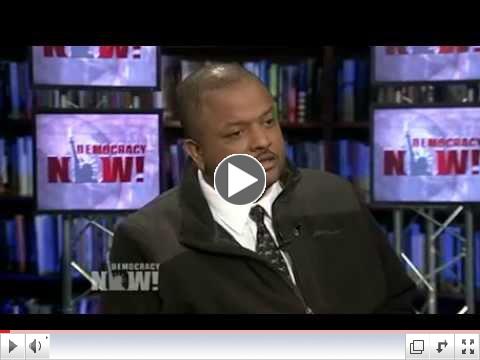 | From Democracy Now!
|
By Amy Goodman
Democracy Now
Dec. 29, 2014 - Some 20,000 people, including a sea of uniformed officers, gathered in New York City on Saturday for the funeral of NYPD Officer Rafael Ramos, one of the two killed in a targeted ambush one week before. It was said to be one of the largest police funerals in New York City history. Controversy erupted as hundreds of police turned their backs on Mayor Bill de Blasio as he delivered a eulogy inside the church, protesting his earlier comments on police brutality and racial profiling. It was the second time officers have turned their backs on de Blasio since the two officers were killed. We are joined by Adhyl Polanco, an NYPD officer who says those who shunned de Blasio do not represent the feelings held by many police officers. Polanco previously blew the whistle on superiors who told officers to meet a quota under "stop and frisk," or face punishment - a move that led to his suspension without pay and later modified assignment.
Transcript
This is a rush transcript. Copy may not be in its final form.
AMY GOODMAN: We turn to new developments since two New York police officers were gunned down in the line of duty at the same time the nation has begun a dialogue over the police killing and targeting of unarmed African Americans. On Saturday, some 20,000 police officers from around the country attended the funeral for Officer Rafael Ramos, who was ambushed in his patrol car along with Officer Wenjian Liu just over a week ago. Their killer, Ismaaiyl Brinsley, had a history of mental health issues and multiple arrests. Officer Ramos's funeral may be the largest in the history of the New York City Police Department. A series of officials addressed the grieving city at a church in Queens, beginning with Vice President Joe Biden.
VICE PRESIDENT JOE BIDEN: This is a city of courage and character, having faced and overcome the toughest challenges. And I'm absolutely confident, as you are, that spirit is still alive and well in this city. And I'm absolutely confident it will guide you in the days and weeks ahead. I believe that this great police force and this incredibly diverse city can and will show the nation how to bridge any divide.
AMY GOODMAN: Rafael Ramos and Wenjian Liu are the first New York City police officers to die in the line of duty since 2011. Among Saturday's most anticipated speakers was New York Mayor Bill de Blasio. While those attending the funeral inside the church quietly applauded him, video shows hundreds of officers outside the church turning their backs to the video monitor as the mayor spoke, in protest of his earlier comments on police brutality and racial profiling. It was the second time officers have turned their backs on de Blasio since the two officers were killed. Before the killings, the head of New York City's largest police union called on officers to request that the mayor not attend their funerals if they were to die in the line of duty. This is an excerpt of Mayor de Blasio's remarks at the funeral of Officer Rafael Ramos.
GOV. ANDREW CUOMO: The threats against New York's police are an insult to the law-abiding New Yorkers, and they will not be tolerated. They will be investigated, and they will be prosecuted.
AMY GOODMAN: That was actually Governor Andrew Cuomo. This is Mayor de Blasio.
MAYOR BILL DE BLASIO: He was so committed to the NYPD. It meant so much to him to be a member of the finest police force in this country. He always wanted to join the NYPD. It wasn't his first career. He started out as a school safety officer, protecting our kids, and he was much loved in that role. He had a dream that he would one day be a police officer, and he worked for that dream, and he lived it, and became it. He couldn't wait to take that test. He couldn't wait to put on that uniform. He believed in protecting others. And those who are called to protect others are a special breed, those who stare down danger, those who sacrifice for all of us.
AMY GOODMAN: All of this comes as New York City's police commissioner, Bill Bratton, said Sunday it was wrong for police officers to turn their backs as Mayor de Blasio spoke at the funeral of Officer Ramos. Bratton called for less rhetoric and a lot more dialogue to defuse the tension between police and the people they're meant to serve and protect. A funeral service for the other slain officer, Wenjian Liu, will be held Sunday.
Well, today we hear directly from a New York City police officer, a member of the largest police department in the country. Adhyl Polanco joins us. He's been with the New York Police Department since 2005. When I interviewed him last year, he described how in 2009 he became critical of the NYPD's stop-and-frisk policy when his superiors told officers to meet a quota of stops, or face punishment. He made audio recordings of the quotas being described during meetings in his precinct, and brought his concerns to authorities, but he said he was ignored. He then took his audio tapes to the media, including The Village Voice, where reporter Graham Rayman wrote a series called "The NYPD Tapes." For several years, Officer Polanco was suspended with pay, but he's since returned to work on the police force.
You went to the wake of Officer Ramos. Can you talk about the reaction of the police to the mayor?
ADHYL POLANCO: Good morning. First of all, I've got to start by saying I'm not here on behalf of the police department. I'm here on my own, as a citizen, as a concerned citizen of New York. I'm not speaking on their behalf. If you can please repeat your question?
AMY GOODMAN: First, your reaction to the killing of these two officers?
ADHYL POLANCO: It's an act of a barbaric coward. This is not acceptable. This is not something that anybody can say we're happy for this. We have lost a brother. We have lost a citizen. I went to the wake and to see the family, the way they're speaking, to see the church. And the people who are supposed to be angry-his family, his wife, the ones that-the people that are affected the most-they are calling for unity, they are calling for peace. How come we cannot honor what they are calling for?
AMY GOODMAN: Your reaction to your fellow officers turning their back on Mayor de Blasio, not in the church, but outside, because there were so many, they couldn't all fit in the church?
ADHYL POLANCO: Absolutely wrong, absolutely wrong. Mayor de Blasio came to the police department, that had a lot of issues with before he got to this police department. Mayor de Blasio came with the attitude that "I can fix this police department." But this police department has a culture that is going to make whoever tried to change that culture and life impossible, including the mayor. It's absolutely wrong to turn their back on the mayor. It absolutely don't show-this is not what we're made of. This is-I was not taught-you know, this does not represent the police department. This does not represent how, when a family calls for peace and unity, you're going to have a hundred officers doing the absolute opposite.
AMY GOODMAN: Do other officers feel as you do?
ADHYL POLANCO: There's many. There's many officers that feel like I do. There's many officers that-
AMY GOODMAN: Last week, the president of the largest police union, your union in New York City, the Patrolmen's Benevolent Association, said the mayor's office should be held accountable for the deaths of Officers Ramos and Liu. This is Patrick Lynch....(Click title for more)
|

The Past Three Recessions Sparked A Chain Reaction Of Layoffs And Lower Pay
By Jim Tankersley
Washington Post
Dec 14, 2014 - WINSTON-SALEM, N.C. - Midway through the last game of the 2013 Carolina League season, after he'd swept peanut shells and mopped soda off the concourse, Ed Green lumbered upstairs to the box seats to dump the garbage.
Green was already 12 hours into his workday. He rose at dawn to lay tar on the highway. As the sun sank, he switched uniforms and drove to BB&T Ballpark, where he runs the custodial crew for a minor-league baseball team. Now it was dark and his radio was crackling. It was his boss, asking him to head back downstairs. Green walked onto the first-base line and into a surprise. In front of 6,000 fans, the Winston-Salem Dash honored him as the team's employee of the year.
The crowd applauded. The game resumed. Green walked back upstairs. The trash wasn't going to empty itself.
Green once held a middle-class job. Now, to make enough money to send his children to college, he works the equivalent of two full-time jobs: one maintaining highways for the state of North Carolina and one ushering fans and collecting trash for a variety of sports teams around Winston-Salem.
The American economy has stopped delivering the broadly shared prosperity that the nation grew accustomed to after World War II. The explanation for why that is begins with the millions of middle-class jobs that vanished over the past 25 years, and with what happened to the men and women who once held those jobs.
Millions of Americans are working harder than ever just to keep from falling behind; Green is one of them. Those workers have been devalued in the eyes of the economy, pushed into jobs that pay them much less than the ones they once had.
Today, a shrinking share of Americans are working middle-class jobs, and collectively, they earn less of the nation's income than they used to. In 1981, according to the Pew Research Center, 59 percent of American adults were classified as "middle income" - which means their household income was between two-thirds and double the nation's median income. By 2011, it was down to 51 percent. In that time, the "middle" group's share of the national income pie fell from 60 percent to 45 percent.
For that, you can blame the past three recessions, which sparked a chain reaction of layoffs and lower pay.
Millions of American jobs disappeared during the 1990, 2001 and 2008 recessions. That's what happens in recessions. But for decades after World War II, lost jobs came back when the economy picked up again. These times, they didn't. And it was a particular sort of job that disappeared permanently in those downturns, economists from Duke University and the University of British Columbia have found: jobs that companies could easily outsource overseas or replace with a machine.
Economists call those jobs "middle-skill" jobs. They include a lot of factory work - the country is down about 5.5 million manufacturing jobs since 1990, according to the Labor Department - but also a lot of clerical and sales tasks that can be handled easily from a country where workers make a fraction of what they make here.
In 1979, middle-skill jobs accounted for 57 percent of the jobs in the U.S. economy, according to calculations by David Autor, an economist at the Massachusetts Institute of Technology. By 2009, the share was down to 46 percent. If the share had not changed over those 30 years - if it had stayed at 1979 levels - there would be 15 million more middle-skill jobs in America today.
When middle-skill jobs vanish, those workers must either take low-skill jobs or compete for the fewer middle-skill jobs left. That extra competition pushes down everybody's pay, as Ed Green has discovered....(Click title for more)
|
|
The war in Afghanistan claimed the lives of tens of thousands of Afghan civilians and about 3,500 foreign troops
By Deirdre Fulton
Common Dreams
Dec. 28, 2014 - With little fanfare, the United States and NATO formally ended the longest war in U.S. history with a ceremony in Kabul, Afghanistan on Sunday, leaving observers to wonder what-if anything-was achieved.
Over 13 years, U.S.-led war in Afghanistan claimed the lives of about 3,500 foreign troops (at least 2,224 of them American soldiers) and an estimated 21,000 Afghan civilians; most experts agree that the country is as violent as ever and that the death toll will continue to rise. Many say the war is over in name only.
"Afghanistan's war is as hot as it has been since the U.S.-led invasion following the 9/11 attacks overthrew the Taliban," Lynne O'Donnell writes for the Associated Press. Some 5,000 members of Afghanistan's security forces-army, police and armed rural defense units-have died this year fighting the Taliban, according to Karl Ake Roghe, the outgoing head of EUPOL, the European Union Police Mission in Afghanistan.
And while the ceremony marked the end of the U.S.-led International Security Assistance Force (ISAF), a new flag for the international mission "Resolute Support" was immediately unfurled.
In late September, the U.S. and Afghanistan signed a controversial Bilateral Security Agreement that allows for U.S. training, funding, and arming of the Afghan military; establishes long-term U.S. military presence in Afghanistan with access to numerous bases and installations in the country; and extends immunity to U.S. service members under Afghan law.
Stars and Stripes set the scene in Kabul: "During an hour-long ceremony in a drab gymnasium at the headquarters of the military coalition that has battled against insurgents for 13 years, generals hailed the end of a mission, while struggling to explain the parameters of what will still be a substantial military operation in Afghanistan."
There will still be roughly 11,000 American troops in Afghanistan next year as part of the Resolute Support mission to train, advise and assist Afghanistan's roughly 350,000 security forces. ISAF spokesman Lt. Col. Christopher Belcher told Stars and Stripes that there would be a total of roughly 17,500 foreign troops in Afghanistan next year, which the publication notes is "far more than the 12,000-13,000 U.S. and NATO officials have been saying would be part of Resolute Support. Belcher could not say where those additional troops would be coming from nor when or why the decision was made to increase their number."...(Click title for more)
|
Moyers: Democrats Bowing Down to Wall Street
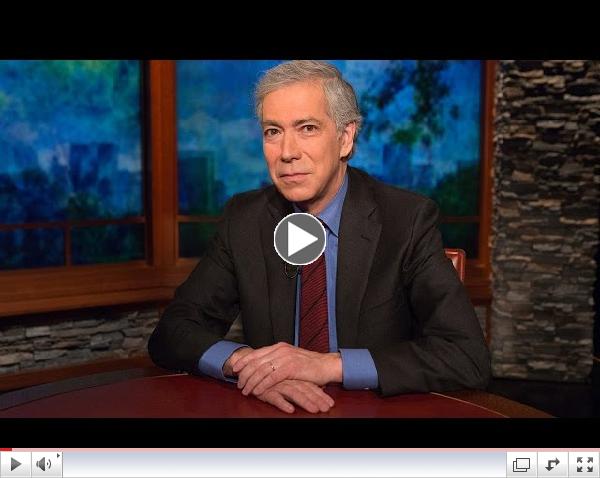 | |
Bill Moyers speaks with outspoken veteran journalist John R. MacArthur, president and publisher of Harper's Magazine, about the problems with the Obama-backed Trans-Pacific Partnership being negotiated in secret and Hillary Clinton's possible presidential campaign.
|
|
Angela Y. Davis: What's Radical in the 21st Century
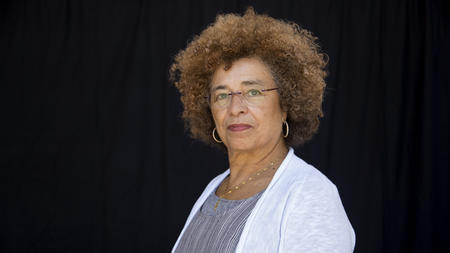
By Patt Morrison Los Angeles Times
Forty-five years after her first UCLA teaching gig attracted the wrath of Gov. Ronald Reagan, Angela Y. Davis is back on campus this semester, as regents' lecturer in the gender studies department. Her Thursday address in Royce Hall, about feminism and prison abolition, sums up some but not all of her work - a long academic career paralleled by radical activism. President Nixon called her a "dangerous terrorist" when she was charged with murder and conspiracy after a deadly 1970 courthouse shootout. She was acquitted, and since then, the woman born in the Jim Crow minefield of Birmingham, Ala., has written, taught and lectured around the world. Her iconic Afro has morphed from its 1970s silhouette; her intensity has not.
Congress is working on prison-sentence reform. Many states have banned capital punishment. Isn't this encouraging?
I've associated myself with the prison abolition movement; that does not mean I refuse to endorse reforms. There is a very important campaign against solitary confinement, a reform that is absolutely necessary. The difference resides in whether the reforms help to make life more habitable for people in prison, or whether they further entrench the prison-industrial complex itself. So it's not an either-or situation.
What would a just prison system look like to you?
It's complicated. Most of us in the 21st century abolitionist movement look to W.E.B. Du Bois' critique about the abolition of slavery - that it was not enough simply to throw away the chains. The real goal was to re-create a democratic society that would allow for the incorporation of former slaves. [Prison abolition] would be about building a new democracy: substantive rights to economic sustenance, to healthcare; more emphasis on education than incarceration; creating new institutions that would tend to make prisons obsolete.
You think prisons won't be necessary one day?
It is possible, but even [if it doesn't happen], we can move to a very different kind of justice that does not require a retributive impulse when someone does something terrible.
Do you watch the prison-themed comedy-drama "Orange Is the New Black"?
I not only saw the series but I read [Piper Kerman's] memoir. She has a much deeper analysis than one sees in the series, but as a person who has looked at the role of women's prisons in visual culture, primarily films, I think [the series] isn't bad. There are so many aspects that often don't [appear in] depictions of people in those oppressive circumstances. "12 Years a Slave," for example - one thing I missed in that film was some sense of joy, some sense of pleasure, some sense of humanity.
You are back this semester at UCLA, the campus from which Gov. Ronald Reagan had you fired.
This was an offer I could not refuse. The students are very different from the students of 1969, 1970. They're so much more sophisticated, in the sense of having more complicated questions....(Click title for more)
|

By Amy Goodman
Democracy Now
Pope Francis is set to make history by issuing the first-ever comprehensive Vatican teachings on climate change, which will urge 1.2 billion Catholics worldwide to take action. The document will be sent to the world's 5,000 Catholic bishops and 400,000 priests who will distribute it to their parishioners. Given the sheer number of people who identify as Catholics worldwide, the pope's clarion call to tackle climate change could reach far more people than even the largest environmental groups. "The document will take a position in favor of the scientific consensus that climate change is real ... and link the deforestation and destruction of the natural environment to the particular economic model of which Pope Francis has been a critic," says our guest, Austen Ivereigh, author of a new biography called "The Great Reformer: Francis and the Making of a Radical Pope." The pope also plans to address the United Nations General Assembly and convene a summit of the world's main religions in hopes of bolstering next year's crucial U.N. climate meeting in Paris.
This is a rush transcript. Copy may not be in its final form.
AMY GOODMAN: This is Democracy Now!, democracynow.org, The War and Peace Report. I'm Amy Goodman, for our last report of 2014.
Pope Francis is set to make history by issuing the first-ever comprehensive Vatican teachings on climate change. In an effort to urge Catholics worldwide to take climate action, the pope will issue a rare papal letter, or encyclical, on climate change and human ecology, following a visit in March to Tacloban, the Philippine city devastated in 2012 by Typhoon Haiyan. The document then will be sent to the world's 5,000 Catholic bishops and 400,000 priests, who will distribute it to their parishioners.
Given the sheer number of people who identify as Catholics worldwide, the pope's clarion call to tackle climate change could reach far more people than even the largest environmental groups. Globally, there are 1.2 billion Catholics, of which around 75 million live here in the United States. The pope also plans to address the United Nations General Assembly and convene a summit of the world's main religions in hopes of bolstering next year's crucial U.N. climate summit in Paris.
Last year, during his first Christmas mass as head of the Catholic Church, Pope Francis called for protection of the environment from human greed.
POPE FRANCIS: [translated] Lord of heaven and Earth, look upon our planet, frequently exploited by human greed and rapacity. Help and protect all of the victims of natural disasters, especially the beloved people of the Philippines gravely affected by the recent typhoon.
AMY GOODMAN: This year, Pope Francis shocked cardinals, bishops and priests by using his annual Christmas remarks to deliver a scathing critique of the Vatican itself, the central governing body of the Catholic Church. He said the Vatican is plagued with "spiritual Alzheimer's," "existential schizophrenia," "social exhibitionism" and a lust for power-all of which have resulted in an "orchestra that plays out of tune," he said. Pope Francis also lambasted the gossip, pettiness and rivalry he said were infecting the church. This is part of what he said.
POPE FRANCIS: [translated] There is also the sickness of the stony mind and spirit, of those who have a stone heart and a hard neck, of those who along the way lose their inner serenity, their vivacity and their audacity, and end up hiding behind papers, becoming machines for practices and not men of God. It is dangerous to lose the human sensitivity that we need to cry with those who cry and to rejoice with those who rejoice.
AMY GOODMAN: Pope Francis has also captured global attention for his criticism of capitalism, his softer tone on key social issues including abortion and homosexuality, and his calls to refocus the church toward the needs of the poor. In his personal life, the pope has chosen to live simply at the Vatican, residing in a guest house instead of the Apostolic Palace, forgoing a chauffeured Mercedes in favor a plain black sedan.
He's also made headlines for his everyday acts of extraordinary compassion. He invited a teenager with Down syndrome, Alberto di Tullio, for a ride in the Popemobile. He embraced and kissed Vinicio Riva, a man severely scarred by a genetic disease. And he washed a dozen prisoners' feet at a jail for juveniles in Rome. The pope also responded to a letter from a rape survivor by personally calling to console her, saying, "You are not alone."
Most recently, the pope has emerged as a star diplomat, a key player in the thawing of relations between the Cuba government and the United States. Cuban President Raúl Castro thanked him for his support.
PRESIDENT RAÚL CASTRO: [translated] This decision by President Obama deserves respect and recognition from our people. I would like to thank and recognize the support of the Vatican, and especially that of Pope Francis, in helping improve the relations between Cuba and the United States.
AMY GOODMAN: Earlier this month, the pope offered to assist the United States with another diplomatic hurdle: its efforts to close Guantánamo prison. The Vatican has reportedly offered to help find adequate humanitarian solutions through its international contacts.
Meanwhile, the pope has rejected change in two other areas: the ordination of women to the priesthood and the church's view on abortion.
Well, for more on Pope Francis, we go to Oxford, England, where we're joined by his biographer, Austen Ivereigh, a British commentator, writer, co-founder of Catholic Voices. He's the author of a new biography called 'The Great Reformer: Francis and the Making of a Radical Pope.'
Austen Ivereigh, welcome to Democracy Now! Let's begin with this encyclical that he's putting out on climate change. How rare and how important is this?
AUSTEN IVEREIGH: Well, first of all, it's an encyclical, which is the highest form of papal teaching. What that means is it's a letter that's sent to the bishops and clergy and indirectly to all the Catholics of the world. And it's saying this is authoritative church teaching, this needs to be taken very seriously by Catholics. So that, in itself, is a major event.
The fact that it's also on ecology, on climate change, is also deeply significant, because there has never been a major document on this subject from the church. So, there is a lot of anticipation about it. He's about to go to Sri Lanka and the Philippines. That's in mid-January. And then he'll be issuing this encyclical, we think, in March or possibly April. And it's going to take a position on the science of climate change. So, this is a case of the church, as it were, wading into a scientific matter and taking a position. As I understand, the document will take a position in favor, if you like, of the scientific consensus that climate change is real....(Click title for more)
|

Diane Ravitch, Michelle Rhee (Credit: MSNBC/AP/Jacquelyn Martin)
Finally, the truth catches up to education 'reform' phonies on fraud, financial mismanagement, and lousy results
By Jeff Bryant
Salon.com
Last week when former President Bill Clinton meandered onto the topic of charter schools, he mentioned something about an "original bargain" that charters were, according to the reporter for The Huffington Post, "supposed to do a better job of educating students."
A writer at Salon called the remark "stunning" because it brought to light the fact that the overwhelming majority of charter schools do no better than traditional public schools. Yet, as the Huffington reporter reminded us, charter schools are rarely shuttered for low academic performance.
But what's most remarkable about what Clinton said is how little his statement resembles the truth about how charters have become a reality in so many American communities.
In a real "bargaining process," those who bear the consequences of the deal have some say-so on the terms, the deal-makers have to represent themselves honestly (or the deal is off and the negotiating ends), and there are measures in place to ensure everyone involved is held accountable after the deal has been struck.
But that's not what's happening in the great charter industry rollout transpiring across the country. Rather than a negotiation over terms, charters are being imposed on communities - either by legislative fiat or well-engineered public policy campaigns. Many charter school operators keep their practices hidden or have been found to be blatantly corrupt. And no one seems to be doing anything to ensure real accountability for these rapidly expanding school operations.
Instead of the "bargain" political leaders may have thought they struck with seemingly well-intentioned charter entrepreneurs, what has transpired instead looks more like a raw deal for millions of students, their families, and their communities. And what political leaders ought to be doing - rather than spouting unfounded platitudes, as Clinton did, about "what works" - is putting the brakes on a deal gone bad, ensuring those most affected by charter school rollouts are brought to the bargaining table, and completely renegotiating the terms for governing these schools.
Charter Schools As Takeover Operations
The "100 percent charter schools" education system in New Orleans that Clinton praised was never presented to the citizens of New Orleans in a negotiation. It was surreptitiously engineered.
After Katrina, as NPR recently reported, "an ad hoc coalition of elected leaders and nationally known charter advocates formed," and in "a series of quick decisions," all school employees were fired and the vast majority of the city's schools were handed over to a state entity called the "Recovery School District" which is governed by unelected officials. Only a "few elite schools were ... allowed to maintain their selective admissions."
In other words, any bargaining that was done was behind closed doors and at tables where most of the people who were being affected had no seat.
Further, any evidence of the improvement of the educational attainment of students in the New Orleans all-charter system is obtainable only by "jukin the stats" or, as the NPR reporter put it, through "a distortion of the curriculum and teaching practice." As Andrea Gabor wrote for Newsweek a year ago, "the current reality of the city's schools should be enough to give pause to even the most passionate charter supporters."
Yet now political leaders tout this model for the rest of the country. So school districts that have not had the "benefit," according to Arne Duncan, of a natural disaster like Katrina, are having charter schools imposed on them in blatant power plays. An obvious example is what's currently happening in the York, Pennsylvania.
School districts across the state of Pennsylvania are financially troubled due to chronic state underfunding - only 36 percent of K-12 revenue comes from the state, way below national averages - and massive budget cuts imposed by Republican Governor Tom Corbett (the state funds education less than it did in 2008).
The state cuts seemed to have been intentionally targeted to hit high-poverty school districts like York City the hardest. After combing through state financial records, a report from the state's school employee union found, "State funding cuts to the most impoverished school districts averaged more than three times the size of the cuts for districts with the lowest average child poverty." The unsurprising results of these cuts has been that in school districts serving low income kids, like York, instruction was cut and scores on state student assessments declined.
The York City district was exceptionally strapped, having been hit by $8.4 million in cuts, which prompted class size increases and teacher furloughs. Due to financial difficulties, which the state legislature and Governor Corbett had by-and-large engineered, York was targeted in 2012, along with three other districts, for state takeover by an unelected "recovery official," eerily similar to New Orleans post-Katrina.
The "recovery" process for York schools also entailed a "transformation model" with challenging financial and academic targets the district had little chance in reaching, and charter school conversion as a consequence of failure. Now the local school board is being forced to pick a charter provider and make their district the first in the state to hand over the education of all its children to a corporation that will call all the shots and give York's citizens very little say in how their children's schools are run.
None of this is happening with the negotiated consent of the citizens of York. The voices of York citizens that have been absent from the bargaining tables are being heard in the streets and in school board meetings. According to a local news outlet, at a recent protest before the city's school board, "a district teacher and father of three students ... presented the board with more than 3,700 signatures of people opposed to a possible conversion of district schools to charter schools," and "a student at the high school also presented the board with a petition signed by more than 260 students opposed to charter conversion." Yet the state official demanding charter takeover remains completely unaltered in his view that this action is "what's bets for our kids."
What's important to note is York schools are not necessarily failures academically, as New Jersey-based music teacher and education blogger going by the name Jersey Jazzman stated on his personal blog. Looking at how the districts' students perform on state assessments, he found that academic performance levels were "pretty much where you'd expect them to be" based on the fact that "most of York's schools have student populations where 80 percent or more of the children are in economic disadvantage," and variations in student test score performance almost always correlate strongly with students' financial conditions. He concluded that what was happening to York schools more represents a "long con" in which tax cuts and claims of "budgetary poverty" have prompted a rapacious state government to "declare an educational emergency, and then let edu-vultures ... pick at the bones of a decimated school system."
The attack on York City schools is not unique. As an official with the National Education Association recently pointed out on the blog Living in Dialogue, "It's the same story that played out in Detroit, Flint, and Philadelphia where these 'chief recovery officers' or 'emergency managers' have all made the same recommendation: to hand over the cities' public schools to the highest private bidder."
Then, hiding behind pledges to do "what's best for kids," these operators too often do anything but.
Charter Schools Takeover, Corruption Ensues
York teachers and parents have good reasons to be wary of charter school takeover. As a new report discloses, charter school officials in their state have defrauded at least $30 million intended for school children since 1997.
The report, "Fraud and Financial Mismanagement in Pennsylvania's Charter Schools," was released by three groups, the Center for Popular Democracy, Integrity in Education, and ACTION United.
Startling examples of charter school financial malfeasance revealed by the authors -just in Pennsylvania - include an administrator who diverted $2.6 million in school funds to a church property he also operated. Another charter school chief was caught spending millions in school funds to bail out other nonprofits associated with the school. A pair of charter school operators stole more than $900,000 from the school by using fraudulent invoices, and a cyber school entrepreneur diverted $8 million of school funds for houses, a Florida condominium, and an airplane.
What's even more alarming is that none of these crimes were detected by state agencies overseeing the schools. As the report clearly documents, every year virtually all of the state's charter schools are found to be financially sound. The vast majority of fraud was uncovered by whistleblowers and media coverage and not by state auditors who have a history of not effectively detecting or preventing fraud....(Click title for more)
|
|
Jessica Chastain and Oscar Isaac in a scene from 'A Most Violent Year.'
Oscar Isaac is determined to achieve the American Dream or die tryin' in this tense New York crime drama
By Peter Travers
Rolling Stone
Dec 30, 2014 - The problems of an indie heating-oil company may seem like small potatoes. But they mean plenty to Abel Morales (Oscar Isaac) in A Most Violent Year, set in the winter chill of 1981 New York, when crime infiltrated everything, bed to boardroom. Abel, an immigrant out to live the American dream, wants to play things legit. But his competitors won't let him. They know he has only 30 days to pay off a loan on a waterfront storage facility. They know he's freaked that someone is hijacking his trucks and beating on his drivers. Plus, the DA (David Oyelowo) is on his ass. Abel, who wears a fancy camel coat and has bought a new home for wife Anna (Jessica Chastain) and their daughters, is being squeezed - hard. The tension is coiled and ready to spring.
That's the setup for this gripping third feature from writer-director J.C. Chandor (Margin Call, All Is Lost). Here, Chandor is walking mean streets paved by Sidney Lumet (Prince of the City) and James Gray (The Yards). The action - a shootout on a bridge, a chase on an elevated train - is aces. But Chandor marks his territory with a more meditative pace. Abel is tempted to compromise by his lawyer (a superb Albert Brooks). But the violence comes from Anna, who reacts like the Mob daughter she is.
Chastain is killer good, shooting off her mouth like a Brooklyn bombshell: "You're not gonna like what'll happen once I get involved." And Isaac is an implosive powerhouse. Chandor gives him the space to set up psychological torments that reverberate hellishly. Evocatively shot by Selma wizard Bradford ...(Click title for more)
|
 By Steve Early By Steve Early
Telesur
Dec 28, 2014 - Two of America's better known left or liberal commentators on labor relations have weighed in with new books that lament the current state of working class organization and suggest various methods of resuscitation.
The well-documented decline of U.S. union membership, bargaining clout, and political influence has more than workers worried. Two of America's better known left or liberal commentators on labor relations have weighed in with new books that lament the current state of working class organization and suggest various methods of resuscitation.
In The Death and Life of American Labor (Verso, 2014), sociologist Stanley Aronowitz points the way "toward a new workers' movement," drawing on his own youthful experience as an industrial union organizer and, more recently, as a faculty union activist in New York City.
Aronowitz has been an influential thinker on the labor left for nearly fifty years. During the 1960s, student radicals turned to him, as a former factory worker and staff member of the Oil, Chemical, and Atomic Workers (OCAW), for advice about the New Left's then still pending and much debated "turn toward the working class."
As he did in past books like False Promises, Working-Class Hero, and From The Ashes of the Old, Aronowitz criticizes mainstream unions for their lack of militancy, diversity, internal democracy, and progressive politics. Now he offers a blueprint for how a "militant minority within unions and the larger workers movement" can make American labor "more combative in challenging capital and the repressive state" over issues like "the super-exploitation of the working poor."
 Veteran labor lawyer Tom Geoghegan is a fellow advocate of union democracy and reform. But Geoghegan, unlike Aronowitz, remains very oriented toward the Democratic Party as a vehicle for political change. Through his new book, Only One Thing Can Save Us (New Press, 2014), Geoghegan apparently hopes to persuade "the party's elite to identify with the cause of labor" once again-just like national policy makers did during the New Deal administration of President Franklin D. Roosevelt. "To recover the purchasing power the country's economy needs, we need some measure of democracy" within private companies, he argues, echoing the liberal architects of the National Labor Relations Act (NLRA) in the mid-1930s. Veteran labor lawyer Tom Geoghegan is a fellow advocate of union democracy and reform. But Geoghegan, unlike Aronowitz, remains very oriented toward the Democratic Party as a vehicle for political change. Through his new book, Only One Thing Can Save Us (New Press, 2014), Geoghegan apparently hopes to persuade "the party's elite to identify with the cause of labor" once again-just like national policy makers did during the New Deal administration of President Franklin D. Roosevelt. "To recover the purchasing power the country's economy needs, we need some measure of democracy" within private companies, he argues, echoing the liberal architects of the National Labor Relations Act (NLRA) in the mid-1930s.
As he did in Which Side Are You On, his first book, Geoghegan pleads for greater public understanding of what unions accomplished for their own members and, indirectly, millions of unrepresented workers after their Depression-era re-birth. Like Aronowitz, he vigorously defends their past contribution to reducing economic inequality. Yet, he too is forced to conclude that "we need something radically different than old fashioned U.S.-style collective bargaining [in order] to raise wages for a workforce that seems perpetually stuck at the entry level without any real control over what they do in their jobs."
New Forms of Worker Organizing
The two authors find common ground on some issues, while diverging widely on others. Both note the emergence of worker formations in retail and fast food that function with voluntary membership, no legal certification, and a greater reliance on what Aronowitz calls "innovative direct action," including short duration protest strikes.
This type of organizing activity reflects, in part, the steady erosion of an 80-year old system of unionization based on "exclusive representation." Under the New Deal model, a single union could win the right to represent all the workers in a particular "bargaining unit" based on a Labor Board-conducted election. Employers-sometimes under strike pressure-could also voluntarily agree to union recognition after being presented with evidence that a majority of their employees had signed union membership cards. ...(Click title for more)
|
|
Keep up with the Moral Mondays with a Red Resolution...
Become a CCDS member today!
 The time is long past for 'Lone Rangers'. Being a socialist by your self is no fun and doesn't help much. Join CCDS today--$36 regular, $48 household and $18 youth. The time is long past for 'Lone Rangers'. Being a socialist by your self is no fun and doesn't help much. Join CCDS today--$36 regular, $48 household and $18 youth.
Better yet, beome a sustainer at $20 per month, and we'll send you a copy of Jack O'Dell's new book, 'Climbing Jacobs Ladder,' drawing on the lessons of the movement in the South in the 1950s and 1960s.
Solidarity, Carl Davidson, CCDS
|
|
|